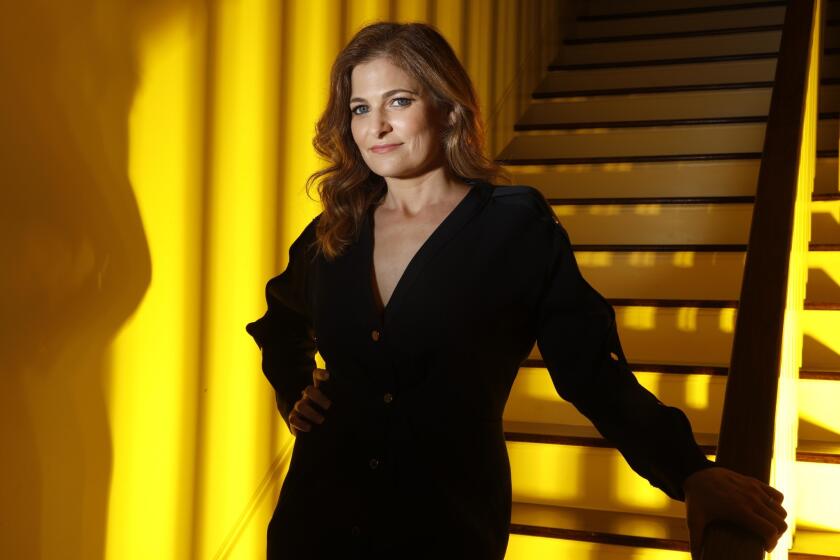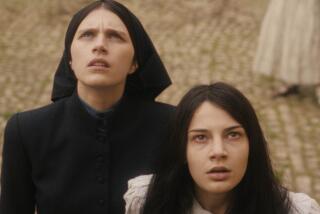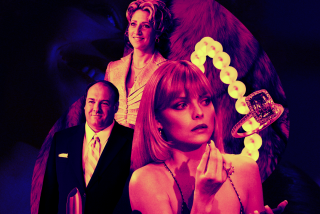Review: Mob wives take over ‘The Kitchen,’ a ‘70s crime drama with more sizzle than steak
Far be it from me to offer marketing tips, but it’s a shame that “The Kitchen,” a mixed bag of a movie about brutal mob warfare, doesn’t feature the tagline “Too many crooks.” That’s more or less the problem facing Kathy Brennan, Ruby O’Carroll and Claire Walsh, three long-suffering New York women who band together and take over their husbands’ rickety criminal empire: too many crooks and, frankly, too many men wasting time, money and firepower, placing their egos over the demands of a business that has yet to maximize its full, bloody potential.
That’s the setup for a punchy, programmatic entertainment that, as written and directed by Andrea Berloff, unfolds a story of righteous female ascendancy within the male-dominated underworld of Hell’s Kitchen in the late 1970s. The gender politics are as appealing as the rock-solid trio of lead actors (Melissa McCarthy, Tiffany Haddish and Elisabeth Moss), even when the movie itself proves less than persuasive.
This is due to no lack of apparent effort. Berloff, an Oscar-nominated screenwriter (“Straight Outta Compton”) making her feature directing debut, plunges into this gritty-seedy milieu with a surfeit of visual energy and a nerve-jangling command of violence. The movie comes at you with a quick, wham-bam style that feels like a nod to the source material, a DC Vertigo comic-book series by Ollie Masters and Ming Doyle. (The shadowy widescreen cinematography is by Maryse Alberti, the showily retro production design by Shane Valentino.)
The plot is “Widows” and the mood is “Goodfellas,” even if the actual time and place hew closer to another Scorsese classic, “Taxi Driver.” The 1978 Hell’s Kitchen that we see and hear is a proudly ungentrified enclave of Irish American life, where graffiti-covered subway trains rumble past Catholic churches and neon-lit sex shops. In rapid succession we meet Kathy, Ruby and Claire, all of whom have married into a local protection racket that treats them as trophies at best, afterthoughts at worst.
Kathy (McCarthy) has two kids with Jimmy (Brian d’Arcy James), the only guy in the bunch who might conceivably be described as decent. Claire (Moss) is regularly pummeled into submission by her husband, Rob (Jeremy Bobb), while Ruby mainly dwells in the shadow of hers, Kevin (James Badge Dale), and of her vile mother-in-law (a scowling Margo Martindale). The three men work together as the operation’s chief heavies, and when they’re arrested after a robbery and sentenced to three years in prison, the gangleader, Little Jackie (Myk Watford), assures the wives they’ll be well taken care of. It turns out to be an empty promise.
In desperate need of cash, Kathy, Claire and Ruby join forces and swiftly make their way up the ladder — maybe a bit too swiftly. Before long they’re swaggering their way through a patchy rags-to-riches montage: We see them muscling and manipulating local businesses into paying up, seizing a hefty share of the profits and threatening the reign of Little Jackie and his goons. Montages can make for effective dramatic shorthand, especially with a template as well worn as the gangster picture, but here that shorthand feels more like a shortcut, a means of glossing over the all-important minutiae. The plot of “The Kitchen” twists and buckles but it never fully breathes.
Which is not to say the ride doesn’t hold your attention or interest. Crime often does pay, cinematically speaking; at the very least, it can afford a few stylistic dividends. Our heroines’ rapid rise to the top may not be coherently plotted in every particular, but it is hard to argue with the visual evidence of their conspicuously improved hair, jewelry and wardrobe, from Kathy’s lovely new feather cut to Ruby’s enviable snakeskin jacket.
Some of the narrative detours are especially intriguing, as when Kathy and her crew decide to start branching out, forging deals with Italian mobsters and Hasidic jewelers across a fast-changing New York landscape while eluding the FBI agents on their tail (Common, E.J. Bonilla). Bill Camp is marvelously reptilian as a Brooklyn mafioso who lures them into an uneasy cross-borough alliance. And the picture surges dangerously to life when Domhnall Gleeson shows up as Gabriel, a sexy agent of death with a vague backstory and a long-simmering attraction to Claire. Their scenes together, in which Gabriel trains Claire in the ways of proper execution and corpse disposal, are the movie’s grisliest — and also, disturbingly, its sweetest.
Moss makes the deepest impression of the three leads, mainly because she has the clearest, most dramatic arc as a much-abused woman who learns to fight back and then some. McCarthy and Haddish seem tamped down by comparison; they’re both known for their skill at boisterous mainstream comedy, and they play shrewdly against those associations here as women who are as poker-faced as they are ruthless. You sense that Haddish’s Ruby has more than a few things she’d like to vent as the lone black member of a predominantly Irish family, which means she’s had to endure misogynist and racist contempt.
But as with most of the character wrinkles, that fascinating dimension is acknowledged, and at one point articulated, without being fully dramatized. One of the comparative strengths of “Widows,” last year’s underappreciated heist thriller about three women in similarly desperate straits, was the way it welded the mechanics of genre to razor-sharp observations about race, class and gender. In that movie, suspense and sociopolitical illumination effectively flowed from the same narrative source.
“The Kitchen” attempts a similar alchemy, and it, too, is grounded in the resonant idea that only the dismantling of the patriarchy can ensure a woman’s survival. But it has nowhere near the same dramatic cohesion, the same rooting in character. What it does boast a lot more of, unsurprisingly, is violence: bone-cracking sound design, out-of-nowhere gunfire and any number of other easy, kicky thrills that serve as the movie’s most recognizable debt to Scorsese. As the movie seems to remind us, nothing levels the playing field like a good killing.
‘The Kitchen'
Rating: R, for violence, language throughout and some sexual content
Running time: 1 hour, 43 minutes
Playing: Starts Aug. 9 in general release
‘The Kitchen’
When “Straight Outta Compton” co-writer Andrea Berloff was tapped to direct “The Kitchen,” a female-driven mob drama for Warner Bros.’
More to Read
Only good movies
Get the Indie Focus newsletter, Mark Olsen's weekly guide to the world of cinema.
You may occasionally receive promotional content from the Los Angeles Times.








